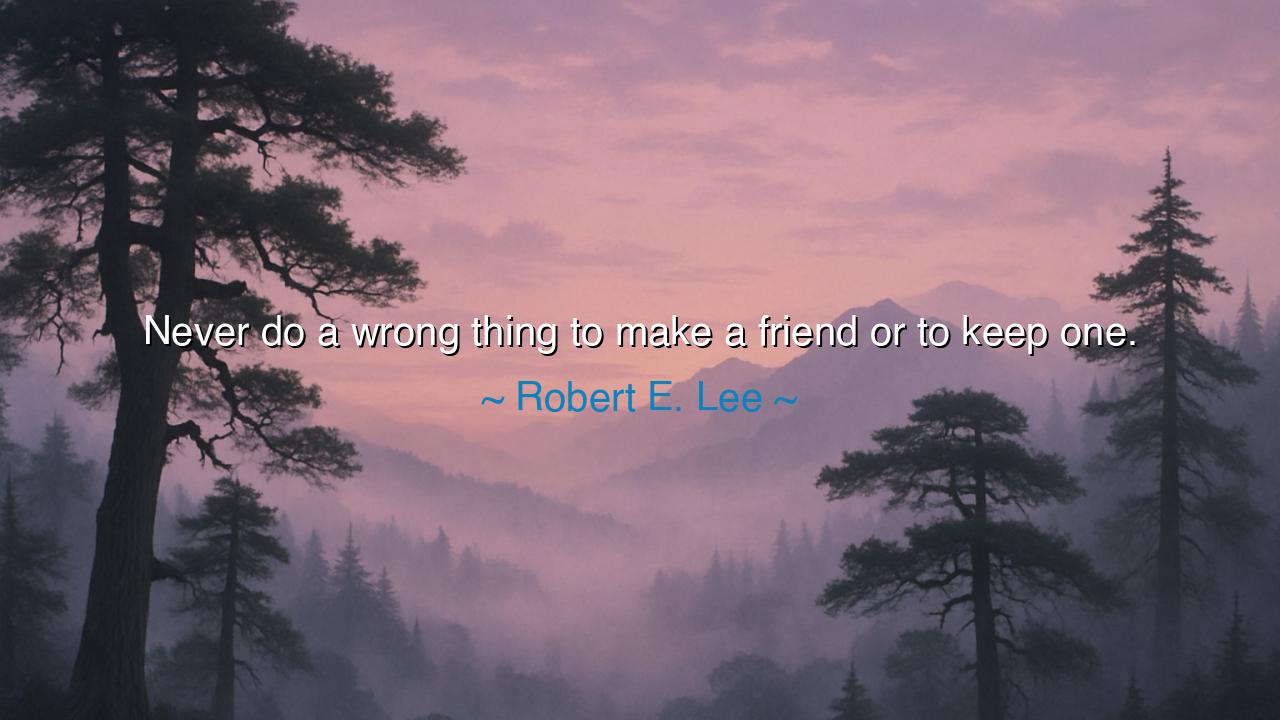
Never do a wrong thing to make a friend or to keep one.






The words, “Never do a wrong thing to make a friend or to keep one,” spring from the steadfast heart of Robert E. Lee, a man whose life, whatever history may judge of his choices, was marked by discipline, duty, and moral conviction. These words, simple yet thunderous in their moral clarity, call forth an ancient truth—that integrity must stand above affection, and that friendship born or maintained through wrongdoing is no friendship at all. In this saying, Lee speaks not merely as a soldier of his age, but as a guardian of the eternal code of honor: that no bond, however dear, is worth the price of one’s conscience.
To the ancients, virtue was the highest treasure, more precious than gold, more enduring than fame. In the old Roman spirit, they believed that a man’s word and actions were his true armor, and that to betray one’s sense of right was to wound one’s soul beyond healing. Lee, schooled in that same tradition of moral fortitude, understood that friendship tested by righteousness is friendship purified by fire. A true companion does not demand that we lower our standards; he helps us rise higher. The false friend, on the other hand, whispers that loyalty is reason enough to do wrong—and thus becomes a tempter in disguise.
Consider the story of Marcus Brutus and Julius Caesar, that tragic tale of friendship and betrayal. Brutus loved Caesar as a friend, yet when faced with what he believed to be a greater duty to Rome, he chose to strike. His act was misguided, yet born from a heart that refused to let personal affection outweigh his sense of justice. Though the deed brought sorrow and ruin, it stands as a monument to the conflict between loyalty and principle. Brutus reminds us that a man may lose all—companionship, power, even life—but if he clings to his conscience, he dies with honor intact.
Lee’s counsel is not merely a warning—it is a light for those who would walk the narrow path of integrity. To do wrong for the sake of friendship is to trade truth for comfort, and to make one’s soul a servant to fear. Such actions seem small in the moment: a lie told to protect a friend, a rule bent to please another, a silence kept when truth should be spoken. Yet these are the seeds of corruption, and once sown, they bear bitter fruit. He who compromises his virtue for the sake of affection builds his house on sand, for when the storm comes, both friendship and honor will crumble.
There is a deeper courage in refusing to do wrong, even when it means standing alone. It is the courage of the man who says, “I will lose what is dear rather than betray what is right.” Such strength may bring loneliness, but it also brings peace. For no companionship can replace the quiet dignity of a clean conscience. True friends will understand; the false will fall away—and in their departure, they reveal their worth. In this way, moral steadfastness becomes the test by which all relationships are measured.
To live by Lee’s words is to walk in the company of truth. It means holding fast to principles when others waver, speaking honesty when silence would be easier, and acting with justice even when affection pleads otherwise. It means loving others deeply, yet loving what is right even more. For the bond between souls, like the bond between steel and fire, grows strongest only when tested by the heat of truth.
And so, my child, let this teaching take root in your heart: Never trade righteousness for relationship. Do not let affection make you weak, nor fear make you false. Be the kind of friend who uplifts, not one who corrupts. If you must choose between pleasing another and preserving your integrity, choose the latter without hesitation. For those who walk in truth will never walk alone—their conscience, bright and steady, will be their eternal companion.
Thus, as the ancients taught, and as Lee himself lived, remember: the world may praise the charming, but it will always revere the honorable. Keep your soul unspotted by compromise. Let your loyalty be governed by virtue, not vanity. For friends come and go, but the light of integrity, once lost, is the hardest treasure to reclaim.






AAdministratorAdministrator
Welcome, honored guests. Please leave a comment, we will respond soon